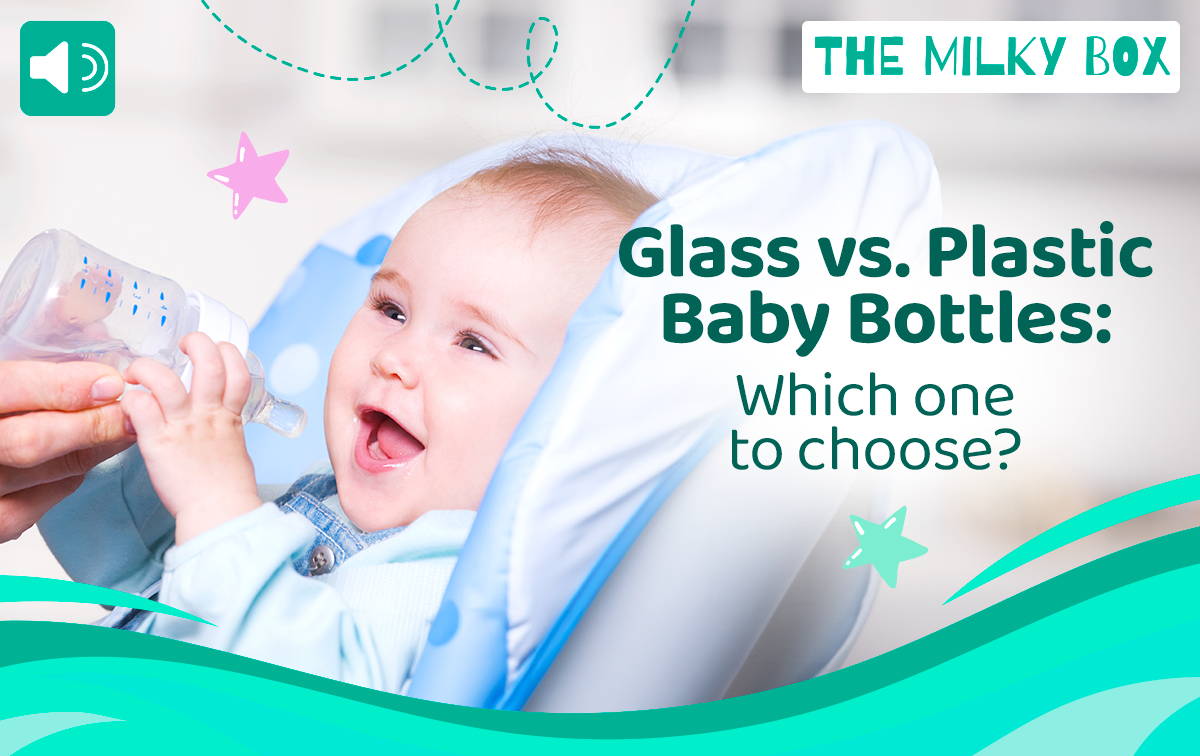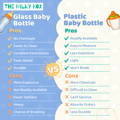Absolutely. Glass bottles are much easier to clean and sterilize than plastic baby bottles because they can tolerate the high heat of the dishwasher.
Glass vs. Plastic Baby Bottles: Which One to Choose?
By: Suzanne Renee' - Updated April 11, 2024 - 11 Minute Read

Your family has found the perfect European baby formula that fits your baby’s nutritional and digestive needs; now, you only need a baby bottle. Unfortunately, this is not as easy as it sounds.
With different materials, shapes, and sizes, it may seem impossible to narrow down your choices.
In this article, we will help guide you in the decision of what kind of bottles to buy for your baby. We can start with the question - Are glass or plastic baby bottles better for your baby?
Table of Contents:
1. Should I Use Plastic or Glass Baby Bottles?
2. Plastic Baby Bottles
3. What To Know About Plastic Baby Bottles
4. Pros of Plastic Baby Bottles
5. Cons of Plastic Baby Bottles
7. What To Know About Glass Baby Bottles
10. Glass vs. Plastic Baby Bottles
11. Stainless Steel vs. Plastic Baby Bottles
12. Which Feeding Bottle is Best for Baby Glass or Plastic or Steel?
13. Frequently Asked Questions
Should I Use Plastic or Glass Baby Bottles?
If your family is new to bottle feeding, you have probably wondered what type of bottle to buy. It can be hard deciding which kind of bottle is right for your growing family, especially with so many options on the market.
Caregivers usually start looking at plastic bottles as these easy-to-find baby bottles are lightweight, unbreakable, and incredibly affordable. However, more recently, glass baby bottles have become popular as families become more concerned about the environmental and potentially harmful chemicals associated with plastics.
Plastic Baby Bottles
Plastic is perhaps the most common and widely available type of baby bottle. Since they are easily found at grocery stores and neighborhood markets, prices tend to be very affordable.
Unfortunately, there are potential health concerns associated with using plastic products, and many parents have valid worries about environmental impact.

Industrial Chemical
Health concerns start with the potentially harmful chemical BPA and related BPS and BPF compounds in many plastic bottles. BPA/BPS/BPF can all mimic estrogen in the body and may negatively accelerate the timing of puberty, decrease fertility in both boys and girls, increase body fat, increase risk of certain cancers in the future and negatively impact the endocrine, digestive, nervous and immune systems.
Today, plastic baby bottles manufactured by American companies no longer leach chemicals like BPA. The U.S. Food and Drug Administration (FDA) insists manufacturers only produce BPA free plastic bottles or sippy cups starting in 2012.
What To Know About Plastic Baby Bottles
It is essential that families know that just because a product is labeled as BPA free doesn't mean it's entirely safe to use. Seventy percent of all BPA free plastic bottles still leach harmful chemicals (including endocrine system disrupting parabens), into food and beverages, including into your baby’s formula.
Moreover, microplastics are an acknowledged growing concern in plastic beverage containers, with the average American consuming a credit card size of plastic weekly!
In fact, BPA was widely replaced with BPS (bisphenol S), a similar compound and may have similar effects.
Environmental Harmful
BPA/BPS/BPF free worries aside, plastic pollution has become a highly pressing ecological issue. Approximately 7 billion of the 9.2 billion tons of plastic produced from 1950-2017 became waste, ending up in landfills or dumped, and plastic bottles tend to be a top contributor.
We have noticed that many companies have noticed and started using Polypropylene plastic components that are widely accepted by most single-stream recycling programs.
Pros of Plastic Baby Bottles
Let us take a closer look at the advantages of plastic baby bottles for families that may be concerned about this option.
🍼 Readily Available: Found in almost all grocery stores and chain retailers.
🍼 Easy to Measure: Transparent material and clear markings of plastic bottles make it easy to measure water going into your baby’s powdered formula and how much milk your little one drinks.
🍼 Affordable: A plastic bottle generally is less costly vs glass bottles.
🍼 Light: They are lightweight, making it easier for your baby to grip and hold on to their baby bottle.
🍼 Shatter Proof: Plastic bottles are relatively unbreakable and take impact exceptionally well, so there are no worries about shattered glass and do not require silicone sleeves.
Cons of Plastic Baby Bottles
A quick overview of some things that may cause concern for your baby’s health or the world they grow up in.
🍼 Harmful chemicals: Even though nearly all plastic bottles are now BPA-free, they still leech chemicals into your baby’s formula.
🍼 Cleaning Difficulties: A plastic bottle is prone to scratches even from something as gentle as a bottle brush. These tiny spaces are perfect for bacteria to grow.
🍼 Does Not Withstands Sanitizing: Too-high temperatures increase melting risk and emphasize leaching concerns.
🍼 Absorbs Odors: Plastic absorbs odors such as sour milk that are not always easy to remove with a bottle brush.
🍼 Less Durable: When it comes to glass vs. plastic baby bottles, families will find that they wear out a lot sooner.
Glass Baby Bottles
Information has increased, confirming that your infant’s bottle is as important as your baby’s drinks. As glass baby bottles have grown in popularity, they have become easier to find, and prices have become more reasonable. You can also find rubberized glass bottle covers to prevent breakage from dropping.

Environmentally Friendly
Choosing glass means you have a sustainable option that reduces plastic waste and guarantees that your baby’s bottle will be chemical-free.
What To Know About Glass Baby Bottles
Using a glass baby bottle solves many problems families encore with plastic containers. Many parents consider them to be the best option for their little ones.
Most glass bottles are tempered, so they are stronger and resist breaking or chipping if dropped. Add a silicone sleeve as a bottle cover to prevent the breakage of other glass bottles.
Pros of Glass Baby Bottles
These are a few advantages of glass baby bottles vs. plastic bottles to aid your inquiry.
🍼 No chemicals: Glass bottles contain no harmful chemicals, so there is no need to worry about chemicals leaching into your baby’s milk.
🍼 Cleaning Ease: Glass baby bottles are much easier to clean with regular soapy water than plastic. Glass containers are less likely to develop scratches with a bottle brush that can hold on to odors and residue.
🍼 Complete Sanitization: Glass baby bottles can take higher temperatures without worrying about melting or warping.
🍼 Odor Free: Glass bottles are less likely to absorb odors that may impact the freshness and taste of your breast milk or formula.
🍼 More Durable: Families will never have to worry about glass bottles wearing out. Choose a glass that is harder to break than your glass bottles can last through multiple children or be upcycled for many other purposes, including adding sippy cups lids.
It is good to know that most glass bottles are now also made with reinforced glass instead of what we would call regular glass. If they hit exactly right and break, the shattering glass will disintegrate into rounded pebbles rather than sharp shards, reducing the chances of your little one getting hurt.
Cons of Glass Baby Bottles
Although glass bottles have many positives to carrying your baby drinks, a few negatives may have parents pausing.
🍼 More expensive: As glass baby bottles have gained popularity, prices have gone down, but versus plastic bottles they do tend to cost more.
🍼 Availability Growing: You probably may not find as many glass bottles at your local stores, but they are certainly more available as they grow in popularity, they are certainly more available.
🍼 Heavy: Glass bottles are usually heavier, making it difficult for your baby to hold as they age. This can also add additional weight to your diaper bag.
🍼 Breaking Possibilities: Glass baby bottles use reinforced glass, making it extraordinarily tricky but not impossible to break.
Glass vs. Plastic Baby Bottles
A quick overview for families on their bottle-feeding journey.

Stainless Steel vs. Plastic Baby Bottles
Another option for your baby is stainless steel baby bottles. A great option that lets you worry less about shattering glass and cracking parents find with glass containers. Stainless steel also has no chemical leaching worries you may encounter with plastic.
Stainless steel baby bottles have cons, including the weight and the fact that they tend to be pricey. Families are also more limited in the variety of bottle styles. For instance, finding a stainless-steel bottle vented to reduce gas and colic.
Other Baby Bottle Types
Like the glass bottle, an up-and-coming bottle is silicone bottles. This bottle is eco-friendly and has a breast-like nipple. Silicone bottles provide a soft, breast-like surface for babies to grasp when feeding. The nipple is softer than average and has a vent on either side to help your baby ingest less air with each swallow.
However, there are some downsides. The pliable structure in silicone bottles does not create a stiff bottle body, and because the bottle's base is much narrower than the top, it can tip over. Also, silicone's soft and squeezable nature may spray a small stream of milk from the nipple when slight pressure is applied.
Organic Baby Bottle
Choosing a safe baby bottle free from toxic materials is crucial for your baby's health. Once you have found the perfect bottle, the next step is to find the right infant formula that aligns with your family's strict requirements.
The right formula should give your baby all the necessary nutrients for healthy growth and development. Researching and selecting a formula that meets your baby's needs and suits your family's values is essential.
The Best Organic Baby Formula
The superiority of European organic baby formulas is widely recognized for their unparalleled use of the highest-quality ingredients and the strictest regulations for the welfare of infants.
HiPP and Holle, two of the most well-known European baby formula brands, are produced using organic farming practices specifically designed to promote infant growth and development. From the farm to the bottle, only clean, pure, and carefully selected ingredients are permitted, ensuring that your little one receives only the best.

European Baby Formula
The European Union's guidelines mandate that all European organic baby formulas be free from pesticide residue, growth hormones, genetically modified organisms (GMOs), synthetic chemicals and preservatives, heavy metals, and potentially toxic ingredients.
To ensure that the milk used in baby formulas has a higher protein content than dairy products, baby formula manufacturers in Europe must use only milk from animals grazing on grass pastures.
At every stage of the European baby formula production process, checks and balances are put in place before an organic stamp is allowed on your infant's nutrition. These strict rules apply to each stage of the process, from the farming practices to the final product, ensuring that your baby receives safe and healthy nourishment.

Which Feeding Bottle is Best for Baby Glass or Plastic or Steel?
The Milky Box sincerely believes harmful chemicals should be avoided in your baby’s bottle and your infant’s nutrition.
We work diligently to only source powdered infant formula that will support your baby’s physical growth and cognitive development with the best European-certified organic ingredients.
Frequently Asked Questions
Are glass baby bottles dishwasher-safe?
How do I know if a plastic baby bottle is BPA-free?
If a plastic baby bottle was manufactured in the U.S. after 2013, it is BPA-free. All plastics that contain BPA are typically labeled “PC” or “7,” indicating polycarbonate plastic.
Can you use glass bottles to store breast milk as well?
Yes, you can! Glass is perfect for formula, breast milk, or water.
Disclaimer:
Please be aware that this information is based on general trends in babies, and it is not medical advice. Your doctor should be your first source of information and advice when considering any changes to your child’s formula and when choosing your child’s formula. Always consult your pediatrician before making any decisions about your child’s diet or if you notice any changes in your child.
Breastfeeding is the best nutrition for your baby because breast milk provides your child with all the essential nutrients they need for growth and development. Please consult your pediatrician if your child requires supplemental feeding.

Suzanne Renee' is an accomplished professional with extensive expertise in the area of infant nutrition, dedicated to promoting the health and wellbeing of children. She started this journey as a foster parent. Suzanne has emerged as a strong proponent of the European baby formula and has become a full time writer of the subject. In her free time, she enjoys camping, hiking and going to church.
Read Next:
Reviewed by Dr. Eric Wood, ND, MA

Dr. Wood is a licensed naturopathic doctor, with a doctorate degree from the Canadian College of Naturopathic Medicine in Toronto, Canada. He received his post-graduation certification in Mind Body Medicine at Harvard University.
With 15 years of experience, Dr. Wood is an Associate Professor of Holistic Nutrition at the American College of Health Sciences in Portland, Oregon. Dr. Wood is an educator, clinician, author, media figure, consultant, and owns his own holistic (naturopathic) medical practice in Ft. Lauderdale, Florida. Dr. Wood is currently researching and drafting books on cancer and pediatrics.
Outside of the medical profession, Dr. Wood loves singing with the Miami Lyric Opera and is an avid musician in South Florida. He also loves spending time with his wife and kids.

